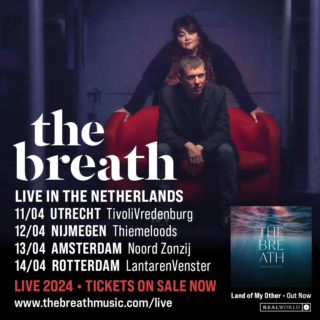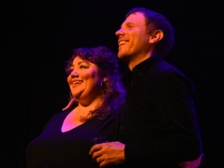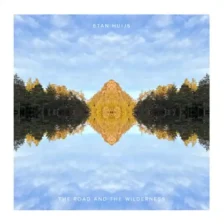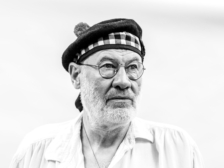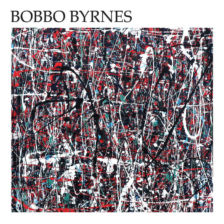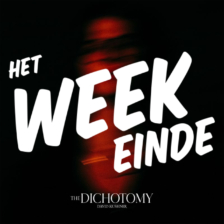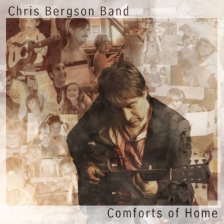The Breath giving life to Land Of My Other, an interview (EN)
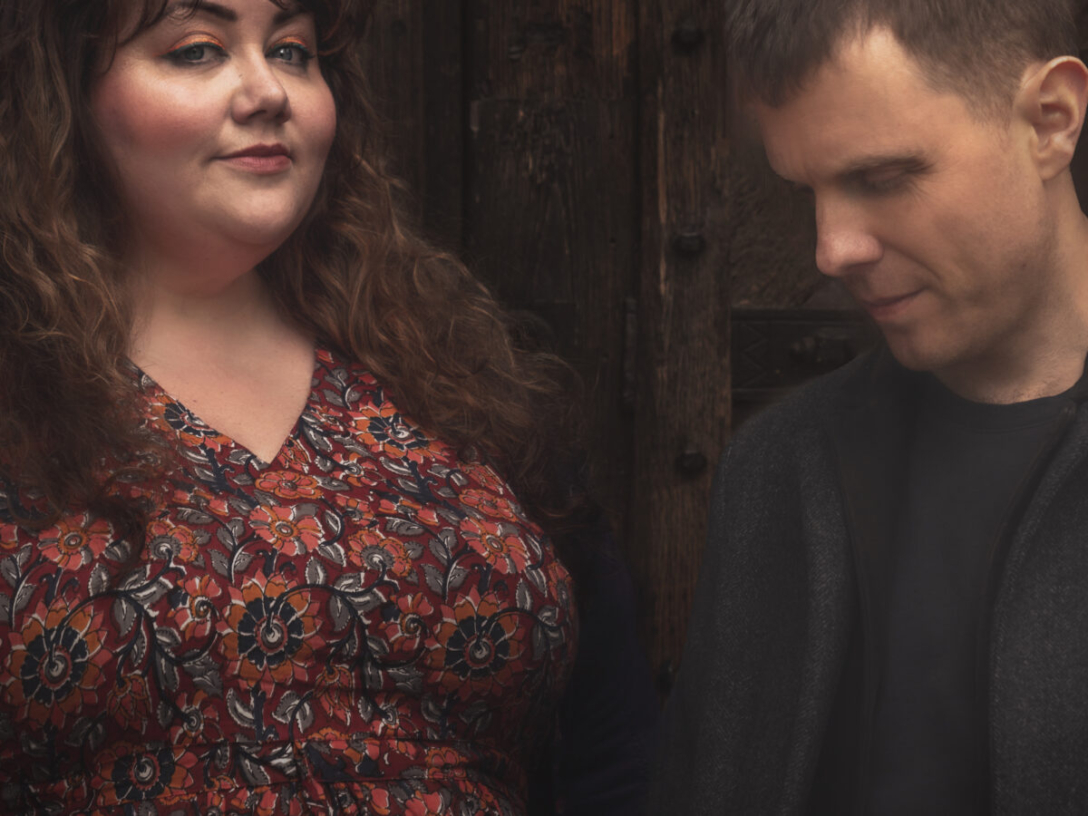
The downright amazing The Land Of My Other was a more than pleasant surprise in autumn 2023 from the voice and hands of both Rioghnach Connolly and Stuart McCallum, who did a small tour of Flanders at the beginning of this very year to let their audiences experience the new tracks and more in a live setting. Beautiful venues in Flanders and very nice performances as Hendrik Vanhee noted in a review of the tour here. Will the Netherlands soon be able to count on the magic the two bring to the stage as well? Written spoke with both Stuart and Rioghnach, about that and more during the tour in Belgium.
WiM: So your tour happened to coincide with snowfall in Belgium. How is it all going along with the snow during the tour? Stuart: Yeah, the snow’s still here, but it seems to have just snowed one day, and then it’s just really cold. So I guess it’s not melting.
WiM: Thank you for taking the time to chat with me. Stuart: That’s all good. Rioghnach is on her way. She’s coming to join us.
WiM: OK. Well, that well, that’s great. How’s the Belgian tour going so far? Stuart: Really nice, yes. The first date was in just a beautiful old church. And then last night it was in kind of like a black box kind of room. Nice audiences. We’re heading off to Beveren tonight.
WiM: Yes, nice towns for a tour of Flanders, just a wee bit too far away. Stuart: Yeah, it would have been nice to meet up with you in person, but next time we’re actually we’ve got a tour in the Netherlands in April, so hopefully.
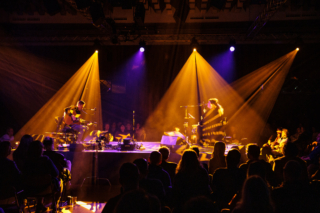
WiM: You’re not saying… Stuart: Yeah, yeah. We are actually. We haven’t announced it yet. It’s just everything is just getting confirmed at the moment, but it’s looking like Utrecht on the 11th, Nijmegen on the 12th, Amsterdam on the 13th and finally Rotterdam on the 14th.
WiM: Where will you be playing in Utrecht and Nijmegen? Stuart: That must be Vredenburg and the Thiemeloods.
WiM: The Thiemeloods, that’s a lovely place. It’s not too big, but you deserve a a bigger spot. But it’s very lovely. Great. I go for lovely. Lovely is always good.
Rioghnach enters the conversation.
WiM: Well, good morning Rioghnach. Congratulations on your fabulous new album. Rioghnach: Thank you. Stuart: How are you doing? Are you alright? Rioghnach: Yeah, I missed breakfast. But I’m ok.
WiM: If I may go back to the album. It really felt like entering a whole new world, where nature, personal growth and loss and even some mysticism and spirituality come together. What I find very appealing is that the way there always seems to be yet another musical colour coming from your music, well, in Rioghnach’s voice and in both Thomas’and Stuart’s playing. Is that something that was different in making and recording this album when compared to the other two? Rioghnach: Like musically or personally? Both. Stuart: You want me to go first? This was the first time where we had an external producer come in. The first two albums I produced. So for me it was a lovely experience just to be the guitarist and a kind of co-writer. As opposed to the guy running the whole recording session and it was nice to have. Someone else’s ear that you could ask and trust. What Thomas really brought was kind of a real focus on the songs and around the song, and he really thought about how to pace the energy on the record. And how to best frame each of the songs in terms of energy in terms of. I think he really added a lot, a lot to it. So I mean, he’s very, very restrained in what he adds and and we when we first spoke with him, we kind of said it, we wanted it to be a duo record.
In the way that people see and hear this, this is a much truer representation of what we do live than the previous records. Rioghnach: Yeah, it’s kind of a compromise between a live show and a an album somewhere in between.
WiM: Well, if this is a compromise, then what would it have sounded like with everything perfect? This already sounds amazing and nowhere near a compromise anywhere at all. I think it’s a great album. Riognach: Thank you, that’s very kind.
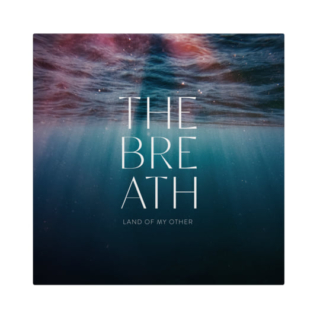
WiM: Was it different in writing the songs this time then? Rioghnach: I think up to now and the way that we write has been sporadic but really intense like we are really prolific. Whenever we’re together, we write a song. Almost every day when we work together, we write songs. It comes really easy, but personally that time was very tumultuous. It was full of turmoil. And I was afraid of what was in my head. And I didn’t want to look at it. So I had to be very careful what I’d be bringing around on the road. And I wanted to be kind to my future self, so I put off writing for as long as we could. We tried to do covers, we busied ourselves just having jams and and lockdown and. But it started with Land Of My Other (the song).
When that rolled out and it was a massive relief that we didn’t mean to write, write it, but it felt like: Now OK, I’m ready. We’re ready. We can go. Because it didn’t hurt. It was cathartic.
WIM: How did the writing come about? Because there’s something very Celtic, something Thin Lizzy-like in your playing, Stuart, in that song. Is that something that you worked out deliberately or was it something that just came up? Stuart: No, I can tell you how it came about. If you like. Do you want a really, really boring technical guitar answer as well? I’m gonna get the guitar and I’ll show you.
WiM: But I must compliment you on on your singing on the whole of the album. You really touched my heart with it. Rioghnach: Thank you. Thank you. It felt very healing to sing like that. Yeah, it is full of grief.
WiM: You mean that song or the whole of the album? Rioghnach: There are definitely more tracks, more parts that when I hear them, I cry, I burst into tears. Thanks for listening.
-Stuart returns holding his guitar.- Stuart: Alright so. So I I’ve I’ve written various pieces of music where there’s more than one kind of thing happening on the guitar at the same time and to me it started from this Villalobos étude. This kind of thing. So I wrote a tune like this. -Strums his guitar- That was one thing that I did. So yeah, its to have this kind of thing going on with the melody going on the top. So I was like, oh, what if I flipped that and I had the the constant thing going all the time on top with the melody underneath. So I was just basically practising that idea. So that’s how it started off this June when we went to the studio. Well, it just kind of naturally started to become this.
Rioghnach: You are our very own countryman, aren’t you? I just love love me a bit of countrymen. Stuart: But for me it’s more from the kind of Gillian Welch, David Rollins kind of. Nothing to do with Thin Lizzy whatsoever.
WiM: It’s the combination with your lyrics and the way you sing it. It really gave me goosebumps. So we’ll get to the questions I have. If you say that that you get to write a song each day, how does the writing come about? Is it Stuart? Is it your playing that starts it, or Rioghnach, is it your singing? How do the songs come about?
Rioghnach: Well, it’s mostly because we’re both pattern freaks, so we love little patterns. So he’ll start noodling. And I’ll start singing patterns over or I’ll start singing, humming patterns to myself. Anyway, in the car, but I think like whenever he can’t ever not be with the guitar in his hand. So I think from the minute we arrived at the venue yesterday to the second, we went on stage, he was playing guitar. So yeah, we wrote about 3 songs yesterday.
Stuart: I can give you more details on that really. Rioghnach -laughing-: Yeah. Give us all of them. Give us all the boring information here. Stuart: All right, so yesterday’s writing fun was inspired by these guys. Mark Mauro Giuliani’s 120 studies for right hand development. And I was getting into this, into page 15. That was a very inspirational one yesterday. It’s just exercises, but when you start adding them into nice chords you get all these nice sounds. So it’s kind of like a right hand. And then you just kind of make some nice chords over the top and then the second book that we got another tune out of was the stick control book. For a snare drummer. So it’s all snare drum patterns. And so you get all the different paths. Rioghnach: The silly things like that. We keep ourselves entertained.

WiM: What I think is wonderful that I I think that there’s something of the chemistry that moment like this shows that is tangible or or noticeable on the album and it’s wonderful how Thomas put that down. Because you don’t get that too many times when an album is recorded, but this one it just, well it crackles from your speakers and well it’s it’s there you definitely caught it on record. Rioghnach: Amazing. Great. Yeah. Thank you. And then we mostly just started drinking at about 11:00 in the morning on the sessions and didn’t stop till about midnight.
Yeah, it was around Christmas time in the studio and we’d come back from Belgium with loads of really delicious beer. And there was a fruit beer. I, like a cherry beer. And that became breakfast beer, breakfast beer, cherry Chouffe, for that matter. -Singing cherry Chouffe, cherry Chouffe-.
We don’t usually, as a rule, have drinks in studio, but sometimes we have to. We’re fairly like when we do that too much we get nothing done. You know we didn’t have time to waste but I think just having Thomas around, we made the most of the moment. It was like a crash course in openness. Yeah, because we wanted it just to be. You’ve gotta be genuine. And it was a very vulnerable record.
WiM: You said when when you were recording the title track that you realised that was the moment now. Now we can do it. Still, with the lyrics that personal, you have to even push yourself further to write the songs like this? Rioghnach: I think some of the record is excruciating even to listen to now. And quite a few more we haven’t even released because they were too much.
Because I think with grief you think that you’re ready or you think you’re in the clear, but it’s not linear. It pulls you back in. It’s like a swing. A pendulum. Yeah. You know, so the swing back is always harder. And that came really in opportune times when we had things booked in Real World studio’s. And you know, that is not a place where you can just reschedule when you’ve when you’ve got your head on. Yeah. So you just have to be brave with the tower of it. Honest, you know.
WiM: Do you then play the songs live or other songs that you leave out from setlist because you think they might get too close for comfort? Rioghnach: Yeah, there’s one that we didn’t put on the album that we always play live cause it it translates. But there is a few that I don’t think we’ll ever do like that’s the same with every album, though. Yeah, I think there’s some.
Stuart: And then there is the kind of need for the instrumentation from the album to kind of get the vibe right and they might prove a little bit too difficult to try as a duo. Like you know from I guess like selfishly for me from a guitar perspective, it would be difficult to make it sound how it needed to sound just with the guitar, whereas there’s quite a few of the tracks that although they don’t have all of the instrumentation that’s on the album, they just kind of work seem to work quite naturally in a duo setting. So we just kind of focus on those. And I guess we’ve got three albums with the material now, so quite enough songs to choose from.
Rioghnach: You have to put the audience first. Fortunately, they like a lot of our songs. Though you’ve got to kind of make a joke or a story between each song sometimes, but also a lot of them are really heavy going and really quite sad and we don’t want to depress everybody. We want people to create a safe base where everyone can feel what they need to. But if you’re going to be, I think, compassionate and humanitarian, you can’t send them off crying into the night. And so like, although I personally really love all of them really hard, hitting angry, sad songs. And for my own indulgence, we wouldn’t do that to to our lovely audience night after night. It would be a very sad tour. We’d come back in bits, I would, yeah.
WiM: You made an obvious choice as to how to record this album, purely as a as a duo. How did that work? Stuart: On the previous two albums, obviously, where there was a lot more instruments and in between the second album and the 3rd, and we’ve done a lot of gigs and I think we’d really kind of, I guess it for me, it was like growing in confidence that that was enough. The music almost gained more by having less instruments, kind of. The more space that there was, the more drawn in people can become, but also the more that it allows people to see the connection between me and Rioghnach, which has always been the core of the whole project. So I think kind of accepting that and feeling confident that that was. Important to represent in as clear a way as possible. And I feel like that Thomas really understood that because he’s the he’s the master of restraint.
WIM: Was Thomas the logical choice for you? Stuart: He is not just an incredible pianist to just pretty much do anything on piano, but you’re just quite happy just to go, you know? Rioghnach: He’s got soft eyes as well. Like he sees the whole. Yeah, the whole song for what it is and what it needs. And he just wanted to provide the lighting, yeah. That’s how, he said. That’s how he put it. He’s like, yeah, I’m just gonna frame. I’m just gonna light you guys. And that was very intuitive. Yeah. Really, really, really special.
Stuart: I think it seemed like it when the label suggested that we use we kind of work with the producer, you know, we had a shortlist with people on it. Yeah, that’s like just a dream come true to go. You know, and honestly like with Real World being the label, they have a lot of connections. But I think we’re both fans of the Gloaming and fans of other albums Thomas has made, you know, certainly for me like some Sufjan Stevens albums are really kind of important ones for me, so. Yeah, it seemed like the obvious choice and the label were excited that we’d asked to work with Thomas and he was excited to work with us. So yeah, it was good.

WiM: Your tracks all have a certain magic, particularly in both your parts. If I’m correctly informed Thomas was convinced to take on the duties after hearing just two lines. And the magic like I said, is always there, like in Cliona’s Wave. How did that come about? Stuart: We started that track in Berlin. Soundcheck. Do you remember? And then the soundguy got enthousiastic. I’ve got the recording from my phone. We just press record and play and the guys like knocking over MIC stands. Yeah, and that was the only track that we recorded without Thomas actually. When there was a session before he came over to England where we captured that one. Yeah. So that was slightly different.
Rioghnach: So close, you know, like I wanted to get the idea that I was singing and to when we go to a really nice studio like Real World they’ve got binaural headphones all over the place you could carry them around and carry them around like babies in my arms. But I like the idea that you could you could record as if you were singing into someone’s ear, you know. And that it was that that close and that fragile. And it’s about the call of like of a daddy, either calling you to your death or warning you of danger and. That’s quite eerie, you know, especially the way your voice sits on water, or how it carries across water.
WiM: What is special is that there are two albums from last year that that really touched me and both of them have your voice on it the other one being IO so how did it come about that you were asked to sing on IO as well? Rioghnach: Peter just rang me up and asked. Yeah, I didn’t know he had my number. I nearly died. I thought it was one of the people in Real World , the head engineer who was working on our record, she made that happen. I think Real World is like a family and we’ve been on the label now for how many years? Seven years. So in that time, we’ve never, like, I suppose Peter hasn’t done an album in 20. So I think you know we’ve got we’re in the familial pot to choose from. So I think I think it was a bit of charity as well you know, but it was really amazing to to hear his voice.
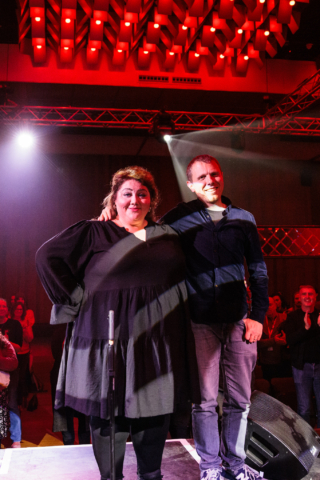
WiM: The two of you there, there’s more than The Breath that you both play and sing for. How do you divide your time between all the things? Rioghnach: Very little sleep, yeah. With a lot of effort here, I think we we’re very privileged that we’re in a place where we don’t do anything that we don’t want to do. You know, but what we do choose to do,you have to throw yourself at it with everything you have to, really. Choose what’s worth taking you away from your family. Because we have pretty young families and yeah, I think personally we do everything with love, yeah.
Stuart: Yeah. I think for me it’s like that in terms of like energy like the the headspace that you’re in, when you are creating is very energizing. And kind of unlocks a lot of issues and things within you, I think you know, and releases them, so it’s quite a purifying kind of place to be in terms of energy, I think. And positivity obviously that is coupled with crippling self doubt you know. You know, kind of imposter syndrome in so many aspects of your life, but I think that there is the flip side of the pendulum is that there is like a real sense of a cathartic sense of realignment through the creative process for me and and I think that’s why I’m addicted to in terms of music making, you know, yes, making sound is great, but it’s the headspace that you’re in when making sound that is the greater thing. And all of the music that we do for me is just a a document of that headspace at a particular time and. And sort of. I’ve done so many albums now that I’ve never listened back to. It’s just always a document of that particular time, not the next day. You kind of like reset every day. You know, if you have a good night. Doesn’t matter cause today’s a different day. You have a bad night. Maybe beat yourself up for it. You know, a few months. -Laughter by both- Well, you know, you just you gotta kind of reset, haven’t you? And go. OK, what? What was is that went wrong last night? What do I need to work on and just kind of just be yourself.
Rioghnach: Yeah, put it up on the shelf, put it in the book. Close the book, put the book on the shelf. Get out there.
WiM: So that is something that you both feel then? Rioghnach: Yeah, I think you know, for me it is about balance. Think every project that I’ve ever been involved with has been important for that to find that equilibrium. It’s just that as time goes by, you distil. Yeah, you can still your your needs and what’s important and what’s cathartic and also what’s representative and authentic to you. And for years as you do what other people ask of you, sometimes there’s a curiosity, sometimes there’s a need. And it it hits all those points for you, but I think as you get older and get momentum, I think we only ever do what we really enjoy after a while. I think this is a project that will always like, there’ll always be a necessity for it in my life just to heal or to. Put that part of me somewhere safe where it will be. It won’t be disrespected or it won’t be. It won’t be taken for granted or it won’t be. You know, I can honour it. It’s been really special. We really we respect that in each other as well. There is a real respect for the place that it gives us.
WiM: When you first met up with each other was was there already a sense of the of the of the chemistry of the magic that you bring together, or how? How did that come about? Rioghnach: No, that’s taken years of charm. And manipulation and we are very close now that just comes as a friendship and because we check in with each other quite often. So you know touring will do that. Touring is always a make or break with with whoever you’re on tour with, you get to know a person better than they know themselves sometimes, and it’s really, really interesting.
WiM: Yeah, well, what what I think is very special that even with this being an Internet connection I can sense it from here so that that is something special that you have the two of you together. Stuart: Yeah. I mean, there’s like a limited there’s a handful of musicians that I’ve worked with where and probably about 3 where I’ve I’ve kind of felt like stuff just happens. You know, and there isn’t really a a rhyme or reason to it, but it does just happen. The yin to the yang, you know all those kind of things. We’re quite different in a lot of ways. But the core kind of morals are very similar. I think on a personal and musical level, but they’re kind of. The way that we’ve arrived here on our different journeys together is very different.
Rhoghnach: So different but great. Great. I’m always learning. Always, every day is a good day.
WiM: We talked about Thomas a bit. Did you ever think that perhaps he could join you for the tour or was that never a a thought? Rioghnach: Well oh, he is a quirk. He’s a quirky guy and a great friend and getting to know him is a journey. But with respect, I don’t think that he likes touring anymore. I think he’s done his share and I think we might do so in the future. Yes. And I know that if we were anywhere near him or he was in London at the same time or in New York at the same time, that he would sit in with us, no problem. I just know that he’s not up for the big schedules. He’s done the big schedules. And respectfully, we wouldn’t ask him unless it was like, really special. Because I know that he loves playing but he’s a studio hobbit. And he’s created a really beautiful space in New York. And you know, people pull at him from all over the world. We know we got the love and we know that we will play. Whenever we’re in New York.
WiM: We were kind of late to the party with the review because it was I think I wrote it in December or the end of November. I think December it was. But when preparing for this interview and for the review I looked to see if if there were many other reviews and it seemed that there wasn’t much promotion for the album. How did that work then? Stuart: Yeah, we’re quite worried about that. I mean, I think there was a reasonable amount of reviews. I think it’s getting harder and harder to get kind of big reviews in. But I think we got reviewed in the Guardian, the Times and the Daily Mail. I think the label wanted to kind of focus on specific territories. So in kind of England, Scotland, Ireland, Wales, were the territories that they wanted to focus on, I guess where the limited budget for PR and all that kind of stuff. So yeah. No, we’re very, very grateful for you picking up on the album and doing the review. And I know that it it was definitely a thing that spurred the promoter, the agent, to kind of finalize the deal for the for the dates in the Netherlands, so it’s very much appreciated.
WiM: That is something that I look forward to very much. Well, with the album meaning so much to me, it was a pleasure to be able to have this interview with the two of you. And thank you very much for your time and have a great next couple of shows. And see you in Utrecht then. Rioghnach: Yeah. Well, thank you and thank you for the interview. It’s been very enjoyable.
Don’t know the band yet and looking to find out more? Then please do check this playlist that Stuart shared: https://tinyurl.com/r59j8tcc.
The Breath play in the Netherlands on the 11th of April (Vredenburg, Utrecht), the 12th (Thiemeloods, Nijmegen), the 13th (Tolhuistuin, Amsterdam) to conclude with a concert on the 14th (Lantaren Venster, Rotterdam).
Photo’s: Jody Hartley
